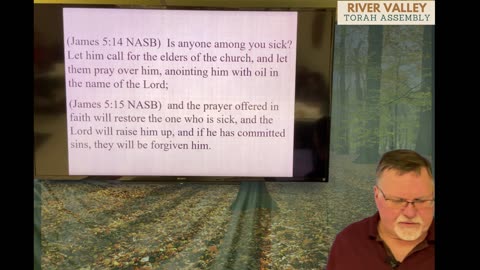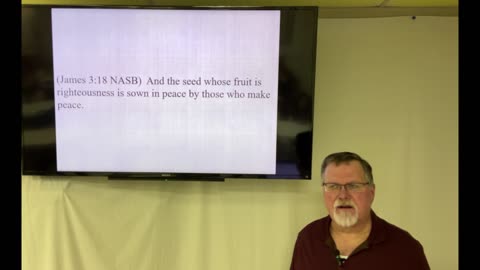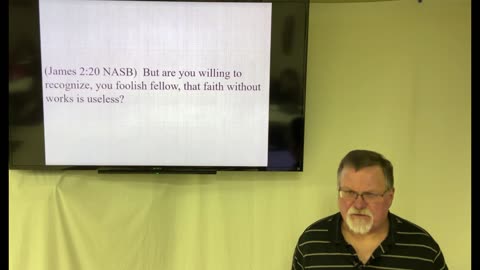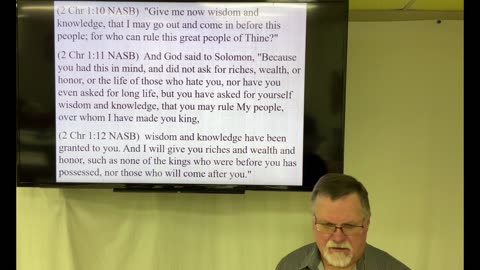-
James 5 - Make no mistake, this is a clear warning to turn toward His Torah. 2025
 RVTAJames 5:19 My brethren, if any among you strays from the truth, and one turns him back, James 5:20 let him know that he who turns a sinner from the error of his way will save his soul from death, and will cover a multitude of sins. This is another quote from the Tanakh. Ezek. 3:17-21 “Son of man, I have appointed you a watchman to the house of Israel; whenever you hear a word from My mouth, warn them from Me. 18“When I say to the wicked, ‘You shall surely die’; and you do not warn him or speak out to warn the wicked from his wicked way that he may live, that wicked man shall die in his iniquity, but his blood I will require at your hand. 19“Yet if you have warned the wicked, and he does not turn from his wickedness or from his wicked way, he shall die in his iniquity; but you have delivered yourself. 20“Again, when a righteous man turns away from his righteousness and commits iniquity, and I place an obstacle before him, he shall die; since you have not warned him, he shall die in his sin, and his righteous deeds which he has done shall not be remembered; but his blood I will require at your hand. 21“However, if you have warned the righteous man that the righteous should not sin, and he does not sin, he shall surely live because he took warning; and you have delivered yourself.” Make no mistake, this is a clear warning to turn toward His Torah. Psalm. 119:118 Thou hast rejected all those who wander from Thy statutes, For their deceitfulness is useless. River Valley Torah Assembly26 views
RVTAJames 5:19 My brethren, if any among you strays from the truth, and one turns him back, James 5:20 let him know that he who turns a sinner from the error of his way will save his soul from death, and will cover a multitude of sins. This is another quote from the Tanakh. Ezek. 3:17-21 “Son of man, I have appointed you a watchman to the house of Israel; whenever you hear a word from My mouth, warn them from Me. 18“When I say to the wicked, ‘You shall surely die’; and you do not warn him or speak out to warn the wicked from his wicked way that he may live, that wicked man shall die in his iniquity, but his blood I will require at your hand. 19“Yet if you have warned the wicked, and he does not turn from his wickedness or from his wicked way, he shall die in his iniquity; but you have delivered yourself. 20“Again, when a righteous man turns away from his righteousness and commits iniquity, and I place an obstacle before him, he shall die; since you have not warned him, he shall die in his sin, and his righteous deeds which he has done shall not be remembered; but his blood I will require at your hand. 21“However, if you have warned the righteous man that the righteous should not sin, and he does not sin, he shall surely live because he took warning; and you have delivered yourself.” Make no mistake, this is a clear warning to turn toward His Torah. Psalm. 119:118 Thou hast rejected all those who wander from Thy statutes, For their deceitfulness is useless. River Valley Torah Assembly26 views -
James 3 & 4 – Diaballō– malicious gossip. Stop someone when they gossip; they will leave fast. 2025
 RVTAJames 4:7 Submit therefore to God. Resist the devil and he will flee from you. James tells us to submit to Elohim. We do that by following His ways instead of the ways of the world. He desires obedience from His people. Psalm 81:10-15 “I, the LORD, am your God, Who brought you up from the land of Egypt; Open your mouth wide and I will fill it. 11“But My people did not listen to My voice; And Israel did not obey Me. 12“So I gave them over to the stubbornness of their heart, To walk in their own devices. 13“Oh that My people would listen to Me, That Israel would walk in My ways! 14“I would quickly subdue their enemies, And turn My hand against their adversaries. 15“Those who hate the LORD would pretend obedience to Him; And their time of punishment would be forever.9 views
RVTAJames 4:7 Submit therefore to God. Resist the devil and he will flee from you. James tells us to submit to Elohim. We do that by following His ways instead of the ways of the world. He desires obedience from His people. Psalm 81:10-15 “I, the LORD, am your God, Who brought you up from the land of Egypt; Open your mouth wide and I will fill it. 11“But My people did not listen to My voice; And Israel did not obey Me. 12“So I gave them over to the stubbornness of their heart, To walk in their own devices. 13“Oh that My people would listen to Me, That Israel would walk in My ways! 14“I would quickly subdue their enemies, And turn My hand against their adversaries. 15“Those who hate the LORD would pretend obedience to Him; And their time of punishment would be forever.9 views -
James 2 - how we are to deal with those in poverty and how to deal with those who have riches. 2025
 RVTAJames 2:1 My brethren, do not hold your faith in our glorious Lord Jesus Christ with an attitude of personal favoritism. In the first 13 verses, James is going to deal with how we are to treat people in different levels of our assembly. James deals with Elohim's views on how we are to deal with those in poverty and how to deal with those who have riches. Both poverty and riches can be a curse. The book of Proverbs tells us that we should not desire either one (Prov. 30:8). Elohim wants us to respect and take care of the poor among us. When we deal with those in poverty, we need to keep in mind that our Messiah was always in poverty. He was born in a borrowed stable. He had to borrow loaves of bread and fish to feed the multitudes. He spoke from a borrowed boat. He often didn't have a place to sleep (Matt. 8:20). He had to borrow a coin to illutrate the truth.(Matt. 22:17-22). He borrowed a donkey to ride into Jerusalem. He borrowed a room to celebrate Passover. He died on a borrowed stake (it belonged to Barabbus, not Him). He was buried in a borrowed tomb (It belonged to Joseph of Aramathaea.) You never hear of Him storing up essentials for Himself as He traveled. Poverty was part of the curse that Messiah bore for us. Riches can also be a curse. James will address that. Paul talked about that (1 Tim. 6:10). Banks are always telling us where to invest our money. Elohim tells us that He has a place for us to invest (Matt. 6:19-20). What is Elohim's solution to poverty? It is not to rob from the rich and middle class and give to the lazy and sluggard. His war on poverty does not attack the mind with education or the stomach with free food. His focus against poverty is at the heart. James is talking about distinctions and divisions among the assembly that is brought about by money. James tells us in this chapter not to be a respecter of persons. James 2:2 For if a man comes into your assembly with a gold ring and dressed in fine clothes, and there also comes in a poor man in dirty clothes, The word used for "assembly" here should actually be "synagogue." James' description of the man with gold rings and beautiful clothes is in contrast to the poor man. The poor man has rags on by comparison. He may have clean clothes, he may not. James puts these two men in contrast with each other and at the extreme end of the social ladder. James 2:3 and you pay special attention to the one who is wearing the fine clothes, and say, "You sit here in a good place," and you say to the poor man, "You stand over there, or sit down by my footstool," James 2:4 have you not made distinctions among yourselves, and become judges with evil motives? James is going into an example of how they are treating the poor among them. He states that they are making distinctions among themselves and becoming judges. Torah tells us to help for the needy in ways that they can provide for themselves (Lev. 19:9-10, Exodus 23:9-11). He also tells us to treat them with dignity and do not take anything from them as collateral on a loan (Deut. 24:10-15). James is using these principles in Torah and applying them to the assembly.24 views
RVTAJames 2:1 My brethren, do not hold your faith in our glorious Lord Jesus Christ with an attitude of personal favoritism. In the first 13 verses, James is going to deal with how we are to treat people in different levels of our assembly. James deals with Elohim's views on how we are to deal with those in poverty and how to deal with those who have riches. Both poverty and riches can be a curse. The book of Proverbs tells us that we should not desire either one (Prov. 30:8). Elohim wants us to respect and take care of the poor among us. When we deal with those in poverty, we need to keep in mind that our Messiah was always in poverty. He was born in a borrowed stable. He had to borrow loaves of bread and fish to feed the multitudes. He spoke from a borrowed boat. He often didn't have a place to sleep (Matt. 8:20). He had to borrow a coin to illutrate the truth.(Matt. 22:17-22). He borrowed a donkey to ride into Jerusalem. He borrowed a room to celebrate Passover. He died on a borrowed stake (it belonged to Barabbus, not Him). He was buried in a borrowed tomb (It belonged to Joseph of Aramathaea.) You never hear of Him storing up essentials for Himself as He traveled. Poverty was part of the curse that Messiah bore for us. Riches can also be a curse. James will address that. Paul talked about that (1 Tim. 6:10). Banks are always telling us where to invest our money. Elohim tells us that He has a place for us to invest (Matt. 6:19-20). What is Elohim's solution to poverty? It is not to rob from the rich and middle class and give to the lazy and sluggard. His war on poverty does not attack the mind with education or the stomach with free food. His focus against poverty is at the heart. James is talking about distinctions and divisions among the assembly that is brought about by money. James tells us in this chapter not to be a respecter of persons. James 2:2 For if a man comes into your assembly with a gold ring and dressed in fine clothes, and there also comes in a poor man in dirty clothes, The word used for "assembly" here should actually be "synagogue." James' description of the man with gold rings and beautiful clothes is in contrast to the poor man. The poor man has rags on by comparison. He may have clean clothes, he may not. James puts these two men in contrast with each other and at the extreme end of the social ladder. James 2:3 and you pay special attention to the one who is wearing the fine clothes, and say, "You sit here in a good place," and you say to the poor man, "You stand over there, or sit down by my footstool," James 2:4 have you not made distinctions among yourselves, and become judges with evil motives? James is going into an example of how they are treating the poor among them. He states that they are making distinctions among themselves and becoming judges. Torah tells us to help for the needy in ways that they can provide for themselves (Lev. 19:9-10, Exodus 23:9-11). He also tells us to treat them with dignity and do not take anything from them as collateral on a loan (Deut. 24:10-15). James is using these principles in Torah and applying them to the assembly.24 views -
James 1 – Testing of your faith – It’s time to know this! Before it is too late.
 RVTAJames 1:3 knowing that the testing of your faith produces endurance. Elohim has a purpose in mind. Tests and trial are useless, senseless, and irrational unless Elohim has a purpose behind them. When external pressures are pressing down on us and we are placed in situations of adversity and tragedy and suffering, the attitude should be that Elohim has caused it for a purpose and He has a higher goal in mind. We should know that Elohim is working something in our lives. This does not necessarily mean that we will always understand this purpose that Elohim has in it. The "why" of many situations is not always easy to ascertain. James says "knowing that the testing of your faithfulness produces endurance." We should look at the translational nuances here. The Greek word for "faith" is the word pistis and it should be translated as "faithfulness." Looking at the usage of these term in the English translations from Hebrew and Greek bear this out to be correct. For instance, in Heb. 10:38 the Greek pistis is translated as "faith" and this is a direct quote from Hab. 2:4. Hab. 2:4 translates enumah as "faith" in this ONE instance in the Tanakh, and that is because it is the only time the Hebrew word enumah is directly quoted from the Tanack by the Brit Hadasha. In all the rest of the Tanakh, enumah is translated as "faithfulness" or something similar. In the same way, pistis is translated as "faithfulness" in Romans 3:3 because it is pertaining to Elohim's faithfulness toward us. In that case, it is impossible to translate pistis with the vague and foggy term "faith." Throughout this letter and in all of the Brith Hadasha, one should use the term "faithfulness" instead of the word "faith" when the Greek word pistis is used. It certainly fits much, much better.12 views
RVTAJames 1:3 knowing that the testing of your faith produces endurance. Elohim has a purpose in mind. Tests and trial are useless, senseless, and irrational unless Elohim has a purpose behind them. When external pressures are pressing down on us and we are placed in situations of adversity and tragedy and suffering, the attitude should be that Elohim has caused it for a purpose and He has a higher goal in mind. We should know that Elohim is working something in our lives. This does not necessarily mean that we will always understand this purpose that Elohim has in it. The "why" of many situations is not always easy to ascertain. James says "knowing that the testing of your faithfulness produces endurance." We should look at the translational nuances here. The Greek word for "faith" is the word pistis and it should be translated as "faithfulness." Looking at the usage of these term in the English translations from Hebrew and Greek bear this out to be correct. For instance, in Heb. 10:38 the Greek pistis is translated as "faith" and this is a direct quote from Hab. 2:4. Hab. 2:4 translates enumah as "faith" in this ONE instance in the Tanakh, and that is because it is the only time the Hebrew word enumah is directly quoted from the Tanack by the Brit Hadasha. In all the rest of the Tanakh, enumah is translated as "faithfulness" or something similar. In the same way, pistis is translated as "faithfulness" in Romans 3:3 because it is pertaining to Elohim's faithfulness toward us. In that case, it is impossible to translate pistis with the vague and foggy term "faith." Throughout this letter and in all of the Brith Hadasha, one should use the term "faithfulness" instead of the word "faith" when the Greek word pistis is used. It certainly fits much, much better.12 views



